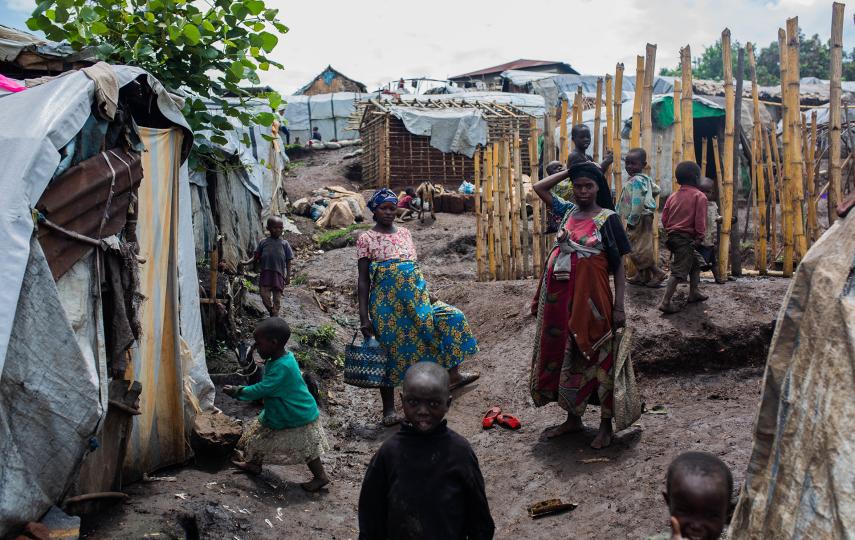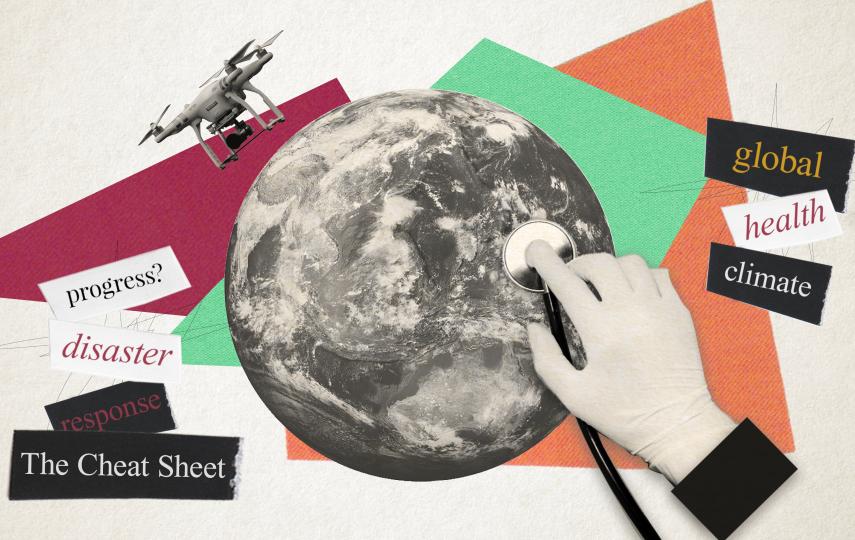Last week, The New Humanitarian published two reports that revealed widespread corruption and abuse in the aid sector in the Democratic Republic of Congo – one of the world’s longest-running humanitarian crises.
In the first story, we showed how fraudsters had been siphoning off money – aid officials think millions – meant from Congo’s most vulnerable in a multi-layered scam that may have gone undetected for over a decade.
In the second, we published the findings of a leaked report – commissioned in the wake of the scam – that looked at everything from corruption in the Ebola response to how women and girls are subjected to abuse by aid workers. The contents were damning.
Both stories triggered debate: some readers were shocked at the scale of fraud and called for change; others noted that similar issues affect humanitarian organisations around the world; a handful suggested lost aid should be par for the course in a place like Congo.
Just in case you aren’t online all day, we’re gathering the reactions – good and bad – for you here. If you mention us or have your say here, we'll add your voice to the debate.
“Shocking”, “horrifying”
Many readers were saddened by the findings of the investigation, which also revealed major problems with the systems aid groups use to root out corruption and abuse.
This is so sad.
— Rachel Scott (@RachelJ_Scott) June 12, 2020
RRM/P was my baby. It was
-early action
-holistic response to IDPs+shocks
-localisation + participation: a response system built on alerts from affected people to locally staffed civil defense system
Ruined by corruption.@newhumanitarianhttps://t.co/TtGqpHRxNo
This (and related article from yesterday) are truly horrifying and necessary reads for anyone working in or researching the humanitarian sector. The problems identified in Congo are particularly egregious but by no means unique (see Oxfam Haiti scandal from a couple years ago). https://t.co/03ea75w1nV
— Reva Dhingra (@Reva__D) June 12, 2020
Shocking? Yes. Surprising? No. Corruption involving contracts btw internat aid gps & nat NGOs is “egregious [...] kickbacks can amount to more than 10% of a contract value. Workers at UN agencies are most cited for being associated with the practice.” #DRC https://t.co/0OMODEHuUi
— Thomas Fessy (@thfessy) June 12, 2020
Calls to action
Other readers channeled their responses into calls for change, providing examples of how they think the aid industry could move forward.
Brilliant sobering report by @PKLeinfeld. Kudos to Mercy Corps for transparency in sharing details of the extensive fraud. Way forward not at all clear. And the majority suffers. EXCLUSIVE: Congo aid scam triggers sector-wide alarm: https://t.co/ZNfJpHoGJ5 (@newhumanitarian)
— Joel Charny (@CharnyJ) June 12, 2020
Congo aid scam triggers sector-wide alarm: https://t.co/ZcoYyjd2s3 @newhumanitarian My 2 cents: Hold perps accountable & stop them from engaging with #aidsector again; give reparations to honest IDPs & have local women lead effort for #livelihoods + prevention of #sexabuse #PSEA
— Inclusion Rider (@TinaTinde) June 12, 2020
excellent work by @PKleinfeld on fraud in the aid community in Eastern Congo. And respect to @mercycorps for investigating this so thoroughly and laying it out - NGOs need to be transparent about this kind of problem. Others should do the same. https://t.co/10iamyMw0u
— Katharine Houreld (@khoureld) June 11, 2020
This is a sobering report & there will be a lot to reflect on here - e.g. why current safeguarding and acct mechanisms have failed so badly. But it's also important to diagnose this properly. The way the review is described here makes me wonder if this will happen (1/3) https://t.co/ee2sLfeuan
— Alice Obrecht (@AliceObrecht) June 12, 2020
This should be a wake up call to the humanitarian community in DRC. Time to rethink the model? Fiddling Assistance to IDPs is just the tip of a whole economy based on aid dependency and exploitation. https://t.co/uaT5iXmlcn (@newhumanitarian)
— Fergus Thomas (@FergusLThomas) June 13, 2020
This is an amazing investigation from @newhumanitarian : read it, learn about these risks, adapt the programmes. Cash isn't the issue, it's only the modality - corruption is an issue no matter the aid received https://t.co/om73HyFTSE
— Louisa Seferis (@LouisaSeferis) June 12, 2020
What’s striking about aid corruption in DRC https://t.co/1mHRbfcIro
— Paul Harvey (@PRHHO) June 12, 2020
is that it’s both shocking but unsurprising. There’s now an increasing body of evidence and examples. A thread
One of the least covered topics in practitioner anti-corruption is how local partners can actually *reduce* corruption risk. E.g.: https://t.co/15wIBAHJ2w https://t.co/KJoMykcTmP
— Oliver May (@oliverbmay) June 12, 2020
It's also a model that's been taken to lots of other places - because it's been effective in lots of ways. I know about RRMs in Yemen, South Sudan, CAR and Iraq. Perhaps a need to urgently review accountability mechanisms with them. Are there features which make them vulnerable?
— Paul Harvey (@PRHHO) June 12, 2020
very true. we are all human and if we see opportunities we exploit them. maybe we don’t always steal from the poorest though. ah maybe i am still a bit naïve
— Rachel Scott (@RachelJ_Scott) June 12, 2020
Change unlikely
Some readers expressed doubt that our findings might prompt change.
"Shake up in sector."
— Jeff Crisp (@JFCrisp) June 12, 2020
Heard it all before... https://t.co/hLFHnrVGxZ
Be careful what you wish for
Some feared our investigation might reduce trust in humanitarian operations and lead to new procedures that could make it harder to get aid to people in need.
Fraud and corruption stories such as this one https://t.co/L2k3VDkKqn uncovered so professionally by @newhumanitarian are likely to result in further audits and compliance measures that risk to stifle #humanitarian action on the ground. pic.twitter.com/N9ZLQlPLNu
— Ed Schenkenberg (@Ed_HEREGVA) June 12, 2020
Aid diversion or “leakage”?
Questions were raised over how common corruption is in the aid industry and whether our findings really deviate from the norm.
Very important story about fraud in the aid sector in east #DRCongo https://t.co/I3gudfK6jt
— Hereward Holland (@Greatlakeshack) June 11, 2020
Thanks for the context John. I would maintain the story is still important: well-researched, seemingly balanced, and highlights an issue I and perhaps others outside of the humanitarian bubble weren't aware of. It would have been easy to write a hatchet job.
— Hereward Holland (@Greatlakeshack) June 11, 2020
The fact that it has a term hasn't justified for it, though; it's just a way the industry has normalised it.
— Paul Currion (@paulcurrion) June 11, 2020
The question is not whether leakage is acceptable; the question is, how much leakage is acceptable?
Experts weigh in
While some readers said they weren't surprised by the story, anti-corruption expert Oliver May explained why it deserves extra attention.
This was a startling fraud in terms of its scale and sophistication, which challenges assumptions about common program controls, and should lead all agencies to reconsider how fraud and corruption risk is managed at a fundamental level. The whole sector needs to read this. https://t.co/SMY6UoYDle
— Oliver May (@oliverbmay) June 11, 2020
Keep on digging
Some – quite astute if we do say so ourselves – readers noted the need for more journalism that holds power to account within the aid sector. Remember, if you have an idea for an investigation or know something we should, here’s how to securely pitch to us.
This is why we need an independent news service for the humanitarian sector. Great investigative journalism @newhumanitarian https://t.co/kRMW56U7rt
— Sandrine Tiller (@sandrinetiller) June 11, 2020





